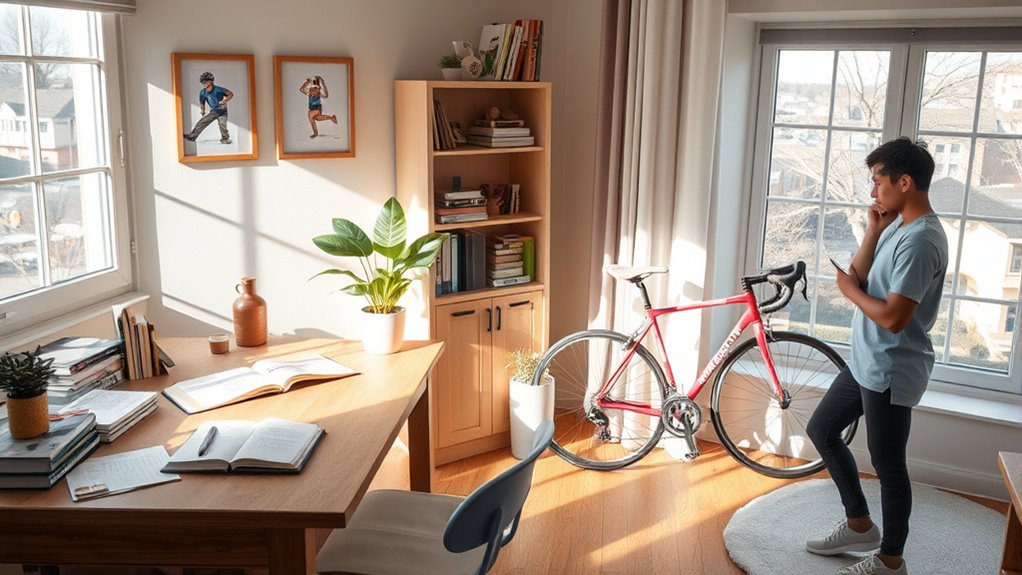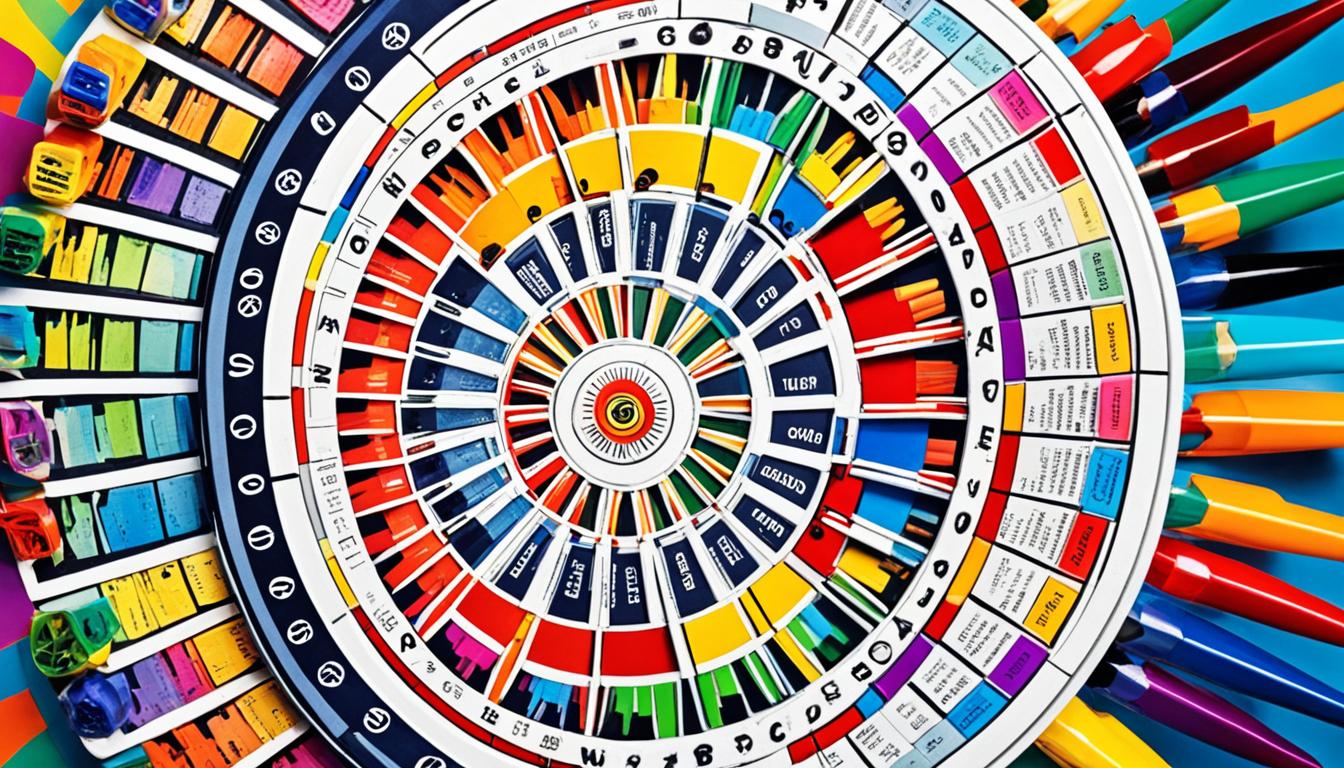Your daily routine reflects your Big Five traits: if you’re conscientious, you likely stay organized and plan your day carefully. Extraverts fill their schedule with social activities, while introverts prefer quieter, solitary moments. Those high in openness seek variety and exploration, keeping things flexible and dynamic. Less conscientious types may have inconsistent routines, and low extraversion can mean more alone time. Want to discover how your personality shapes your day? Keep exploring to find your perfect fit.
Key Takeaways
- Conscientious individuals prioritize structured schedules, goal-setting, and routine to enhance organization and reduce stress.
- Extraverts fill their days with social activities, networking, and high-energy interactions, often at the expense of solitude.
- Introverts prefer solitary or small-scale social routines, balancing alone time with meaningful, selective social interactions.
- Open individuals incorporate diverse, spontaneous activities and explore new hobbies, maintaining flexible and curiosity-driven routines.
- Low conscientiousness leads to inconsistent routines, spontaneous decision-making, and potential organizational challenges.

Understanding your daily routine can reveal a lot about your personality, especially when viewed through the lens of the Big Five traits. Each trait influences how you manage your time and interact socially, shaping your day-to-day habits. If you’re high in conscientiousness, you likely prioritize organization and efficiency, planning your day with clear goals. Your time management skills are strong, allowing you to balance work, rest, and social activities effectively. You probably stick to routines, which help you stay on top of responsibilities and reduce stress. Your social habits might be more deliberate; you prefer meaningful interactions over casual chats, often scheduling quality time with close friends or family. Conversely, if you score low in conscientiousness, your routines may be more spontaneous or inconsistent. You might find it harder to stick to a schedule, leading to last-minute decisions and maybe some missed deadlines. Your time management could be more relaxed, but that might also mean feeling overwhelmed or disorganized at times. Socially, you might avoid large gatherings or prefer smaller, less structured interactions, valuing freedom over routine.
If extraversion is your dominant trait, your daily routine probably revolves around social engagement. You thrive on connecting with others, so your day might include frequent chats, group activities, or networking opportunities. Your energy levels tend to be high, making it easy to fill your schedule with social events. Your social habits are outgoing and expressive, often seeking new experiences and meeting new people. This outward focus can energize your day, but it might also mean less time for solitude or quiet reflection. On the flip side, if you’re more introverted, your routine might lean toward solitary activities or small, familiar social settings. You might prefer spending time alone or with close friends, which helps you recharge. Your social habits are more reserved, and you tend to be selective about when and with whom you share your time. Time management for introverts often involves carving out quiet periods, balancing social interactions with solitude to maintain your well-being.
Openness to experience influences your daily routines by encouraging curiosity and creativity. You might incorporate varied activities, exploring new hobbies or ideas, which keeps your schedule dynamic. Your social habits could involve engaging in intellectual conversations or participating in cultural events. Routine for you isn’t rigid; instead, it’s flexible and adaptable, allowing for spontaneous adventures. If low in openness, your routines tend to be more traditional and predictable. You prefer familiar activities and might stick to a set schedule, with social interactions centered around established routines or familiar circles. Your time management is straightforward, prioritizing stability and comfort over novelty. Incorporating technological tools can help you organize and customize your routines to fit your personality style better. Overall, understanding your Big Five profile helps you see how your personality shapes your daily life, guiding you toward routines that fit your natural tendencies and support your well-being.
Frequently Asked Questions
How Can Knowing My Big Five Profile Improve My Daily Productivity?
Knowing your Big Five profile helps you boost daily productivity by enabling personality adaptation and routine customization. When you understand your strengths and weaknesses, you can tailor tasks and schedules to suit your natural tendencies. This personalized approach reduces stress, increases focus, and makes your routines more effective. By aligning your daily activities with your personality, you create a more efficient and satisfying routine that maximizes your potential.
Are Personality Traits Fixed or Can They Change Over Time?
Ah, in the grand scheme, your personality’s a bit like a fine wine—showing personality stability, but with some room for growth. Research shows trait malleability, meaning your traits can change over time with effort and experience. While core aspects tend to stay consistent, you can develop new behaviors and perspectives, proving that personality isn’t entirely fixed and can evolve, much like a vintage gaining character over centuries.
What Routines Work Best for Introverted Versus Extroverted Profiles?
You should tailor your routines based on whether you’re introverted or extroverted. If you’re introverted, you thrive with solitude and prefer social activities in small groups or alone, so schedule quiet time and meaningful interactions. If you’re extroverted, you gain energy from social activities and larger groups, so plan more social outings and group events. Recognizing your solitude preferences helps you create routines that boost your well-being and productivity.
How Do Big Five Profiles Influence Stress Management Strategies?
Your Big Five personality traits influence how you manage stress, with traits like neuroticism affecting stress sensitivity and extraversion enhancing social support use. Personality flexibility helps you adapt your stress strategies effectively, boosting your stress resilience. Recognizing your profile allows you to tailor coping methods that suit you best, whether it’s seeking solitude or social interaction. Embracing your traits enables you to build stronger resilience and handle stress more effectively.
Can Understanding These Routines Help Improve Personal Relationships?
Sure, understanding routines might seem just about personal productivity, but surprisingly, it can boost your relationships too. By recognizing your Big Five traits, you develop emotional intelligence and empathy, making you more attuned to others’ feelings. Ironically, knowing your routines helps you connect deeper, fostering patience and understanding. So, yes, mastering your daily habits can genuinely enhance your ability to relate, communicate, and build stronger personal bonds.
Conclusion
Understanding your Big Five personality profile can help tailor your daily routine for better productivity and well-being. For example, studies show that highly conscientious individuals are 25% more likely to stick to their routines, boosting success. By recognizing your tendencies, you can create habits that truly fit your personality. So, embrace your unique traits, and design a day that aligns with your strengths—making each day more intentional and rewarding.









